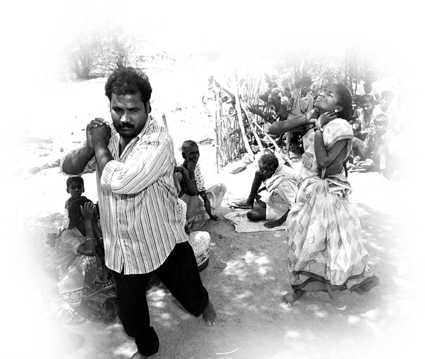
ECHOES asked two groups who received
a grant to recount something of
their work and experiences
A Public Apology

|
ECHOES asked two groups who received a grant to recount something of their work and experiences
|
 Community educators present the suffering of the Dalits through a drama in Kanglvakam, a Dalit village about 45 km south of Chennai/Madras. Photo: Peter Williams, WCC |
Six months ago, unorganised Dalit women of Iverkala, India, celebrated a public apology of an accused Nair (upper class) youth. The incident happened as follows: Mrs Jainamma is a 28 year-old mother of two children and wife of Mr. Luke. On October 10, 1999, before dusk, she went to a nearby junction to purchase some food for her family. The shop is approximately half a kilometre from her house. Both sides of the road are covered by the rubber plantation of a Nair landlord. When she crossed the road, suddenly a Nair youth, who belongs to the nearby place, attacked her. He gagged her mouth and dragged her into the rubber plantations with the intention to rape her. The helpless Dalit woman struggled and tried to escape from his hands. Her clothes were torn. By chance the gag on her mouth released a little so she cried out loudly. When hearing this cry some people came from the junction towards the darkness of the rubber garden. He then pulled down the lady and he ran away. Meanwhile a political rally, on the victory of the general election to the parliament, was passing by. The wretched man mingled into the crowd and began to shout slogans. However, a police van was watching the rally. Quite soon, with the help of some Dalit youths, the Nair was caught by the police. However, some hours after, he was released with the help of some political leaders and with the influence of the police because he was upper caste and rich. Both the ruling and opposition parties tried to rescue him from the case. The Savarnas (the upper class) turned against the Dalits but the Dalit women joined together and denied their traditional leadership. They protested against the attacks and threats. They filed complaints against the accused and protected the victim. Again the police took the man under their custody. The case moved fast; the entire upper class supported the accused including some of his relatives who are eminent political leaders. They offered money and things to the poor woman for withdrawing the petitions. Jainamma and her friends bravely decided to move ahead. In the meantime a local church vicar intervened. Finally the accused Nair fellow and his supporters gave in before the determination of the Dalit women. According to the terms of the conciliations he was released and agreed to apologise on the evening of October 15, 1999, in front of the gate of the cashew factory at the time the women labourers went out for tea break. The accused Nair made a public apology. First of all to the victimised women, to the Dalit community and to whole village. On hearing this all the women clapped their hands and cheered. Some of them cried because this was a first victory over caste domination and gender victimisation in this village. At the same time we, the team of the Dalit Development society, are also very proud of this victory, based on the information and empowerment given to these out-caste women. Achamma John The Dalit Development Society of Iverkala, Kerala India was established in 1994 to support the work for the empowerment of Dalits especially in the are of discrimination based on colour. The main objective of the Society is to analyse the situation and problems of Dalits in the area, create awareness among them on the nature of exploitation and develop willingness to come together and act together. |
| CECUNE - Ecumenical Centre for Black Culture - one of the many bodies engaged in the fight against racism in Brazil |
Based in the state capital of Rio Grande do Sul, in the extreme south of Brazil, the Ecumenical Centre for Black Culture (CECUNE) has been engaged in the struggle against racism in a region colonised for the most part by the Portuguese (Azorians), Germans and Italians. People of African descent represent around 11% of the population in this region and they face anti-Black racism which can be seen in the absolute efficiency of the mechanisms which render them socially invisible. For years no images of the Black population appeared in the media, their history in the region was not mentioned in school curricula, it was researched and documented with the same care as that of other ethnic groups. The social disregard led to very serious social consequences in the form of denial and exclusion and seriously damaged the civic rights and self-esteem of the population of African descent. Given this state of affairs, a group of Black men and women decided to organise to take action in this society. They set up a small independent NGO run and maintained by volunteers, to carry out projects aimed at raising the self-esteem of the Black population. Its activities have been the following:
|